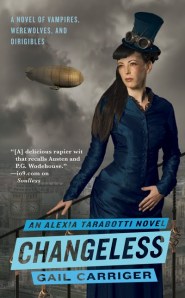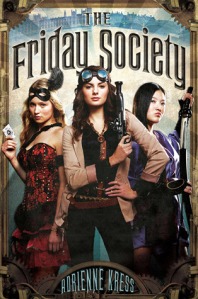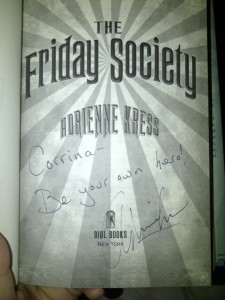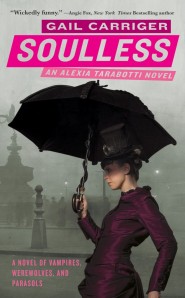Today I read Changeless, the second Parasol Protectorate book by Gail Carriger. Her website is here, and you can find all kinds of information about steampunk, Victorian London, and extra bits about Alexia and her friends. You can also find my review of the first book in the series, Souless, here. 
Alexia Tarrabotti’s recent marriage to Lord Conall Maccon, the Alpha Werewolf of the Woolsey pack, has brought about a lot of changes in her life: her very welcome distancing from her not-so-loving family (unfortunately, it’s not a long enough distance); her appointment by the Queen to the secret Shadow Council, royal advisors on all supernatural matters; and of course, an often naked, commonly furry, and always infuriating husband in her bed. Said husband has suddenly run off (literally–he turned wolf and ran) all the way to Scotland of all barbarous places to visit his former pack–the ones he abandoned more than 20 years ago after they betrayed him. And he does this right when there is a mysterious plague spreading across Europe affecting supernaturals–ghosts permanently lose their tether to the mortal world, and vampires and werewolves lose their special abilities and become human.
Now the new Lady Maccon is off to dreary, wet, uncivilized Scotland via floating dirigible to find her missing (all right, and somewhat missed) husband, complete with efficient butler, impetuous valet, stylish French maid, annoying half-sister, atrociously-behatted best friend, and a French lesbian inventor. Who just made her the most wonderful new parasol, at Conall’s behest. A lot can be forgiven of a man who knows you well enough to commission a weaponized parasol.
****************************************************************************************************************
This is an excellent chapter in the continuing adventures of Lady Alexia Tarrabotti Maccon. We find out more about why Conall Maccon left his previous pack, and about how preternaturals affect supernaturals. We meet more fascinating characters, including the Kingair pack, Major Channing Channing of the Chesterfield Channings, and of course Madame Genevieve Lefoux, the brilliant inventor who dresses like a man and runs a hat shop with her young son and her ghostly aunt. And we get the setup for the next book, when Alexia is revealed to be pregnant, despite the fact that everybody knows werewolves can’t have children. And Everybody Knows is always right, right? Right.
The God-Breaker plague is interesting as the mystery of the book, the way that the Order of the Brass Octopus abducting supernaturals was in the first book. Carriger does a good job of treating the series like a television mini-series–each book has a stand-alone problem that needs to be solved, while gradually building an arc that spans all five novels. Alexia’s world has greatly expanded since her marriage to Conall, and the reader follows her along on her first dirigible ride, her first trip out of England, her first meeting with the Kingair werewolf pack, including their leader, Conall’s great-great-great-granddaughter Lady Sidheag Maccon, her first serious fight with Conall (not counting their constant smaller quarrels), and of course her first pregnancy. This book is particularly well-named, since everything changes.
****************************************************************************************************************
“They are what?”
Lord Conall Maccon, Earl of Woolsey, was yelling. Loudly. This was to be expected from Lord Maccon, who was generally a loud sort of gentleman—the ear-bleeding combination of lung capacity and a large barrel chest.
Alexia Maccon, Lady Woolsey, muhjah to the queen, Britain’s secret preternatural weapon extraordinaire, blinked awake from a deep and delicious sleep.
“Wasn’t me,” she immediately said, without having the barest hint of an idea as to what her husband was carrying on about. Of course, it usually was her, but it would not do to fess up right away, regardless of whatever it was that had his britches in a bunch this time. Alexia screwed her eyes shut and squirmed farther into the warmth of down-stuffed blankets. Couldn’t they argue about it later?
“What do you mean gone?” The bed shook slightly with the sheer volume behind Lord Maccon’s yell. The amazing thing was that he wasn’t nearly as loud as he could be when he really put his lungs into it.
“Well, I certainly did not tell them to go,” denied Alexia into her pillow. She wondered who “they” were. Then she came about to the realization, taking a fluffy-cottony sort of pathway to get there, that he wasn’t yelling at her but at someone else. In their bedroom.
Oh dear.
Unless he was yelling at himself.
Oh dear.
“What, all of them?”
Alexia’s scientific side wondered idly at the power of sound waves—hadn’t she heard of a recent Royal Society pamphlet on the subject?
“All at once?”
Lady Maccon sighed, rolled toward the hollering, and cracked one eyelid. Her husband’s large naked back filled her field of vision. To see any more, she’d have to lever herself upright. Since that would probably expose her to more cold air, she declined to lever. She did, however, observe that the sun was barely down. What was Conall doing awake and aloud so freakishly early? For, while her husband roaring was not uncommon, its occurrence in the wee hours of late afternoon was. Inhuman decency dictated that even Woolsey Castle’s Alpha werewolf remain quiet at this time of day.
“How wide of a radius, exactly? It canna have extended this far.”
Oh dear, his Scottish accent had put in an appearance. That never bode well for anyone.
*************************************************************************************************************
Alexia threw her head back and yelled, “Tunstell!” She had not quite the lung capacity to match that of her massive husband, but neither was she built on the delicate-flower end of the feminine spectrum. Alexia’s father’s ancestors had once conquered an empire, and it was when Lady Maccon yelled that people realized how that was accomplished.
Tunstell came bouncing over, a handsome, if gangly, ginger fellow with a perpetual grin and a certain carelessness of manner that most found endearing and everybody else found exasperating.
“Tunstell,” Alexia said calmly and reasonably, she thought, “why are there tents on my front lawn?”
Tunstell, Lord Maccon’s valet and chief among the clavigers, looked about in his chipper way, as if to say that he had not noticed anything amiss and was now delighted to find that they had company. Tunstell was always chirpy. It was his greatest character flaw. He was also one of the few residents of Woolsey Castle who managed to remain entirely unfazed by, or possibly unaware of, either Lord or Lady Maccon’s wrath. This was his second-greatest character flaw.
“He didn’t warn you?” The claviger’s freckled face was flushed with exertion from helping to raise one of the tents.
“No, he most certainly did not.” Alexia tapped the silver tip of her parasol on the front stoop.
Tunstell grinned. “Well, my lady, the rest of the pack has returned.” He flipped both hands at the canvas-ridden chaos before her, waggling his fingers dramatically. Tunstell was an actor of some note—everything he did was dramatic.
“Tunstell,” said Alexia carefully, as though to a dim child, “this would indicate that my husband possessed a very, very big pack. There are no werewolf Alphas in England who can boast a pack of such proportions.”
“Oh, well, the rest of the pack brought the rest of the regiment with them,” explained Tunstell in a conspiratorial way, as though he and Alexia were partners engaged in the most delightful lark.
“I believe it is customary for the pack and fellow officers of a given regiment to separate upon returning home. So that, well, one doesn’t wake up to find hundreds of soldiers camping on one’s lawn.”
“Well, Woolsey has always done things a little differently. Having the biggest pack in England, we’re the only ones who split the pack for military service, so we keep the Coldsteam Guards together for a few weeks when we get home. Builds solidarity.” Tunstell gestured expansively once more, his fine white hands weaving about in the air, and nodded enthusiastically.
“And does this solidarity have to occur on Woolsey’s front lawn?” Tap tap tap went the parasol. The Bureau of Unnatural Registry (BUR) was experimenting with new weaponry of late. At the disbanding of the Hypocras Club several months previous, a small compressed steam unit had been discovered. It apparently heated continually until it burst. Lord Maccon had shown it to his wife. It made a ticking noise just prior to explosion, rather like that of Alexia’s parasol at this precise moment. Tunstell was unaware of this correlation or he might have proceeded with greater caution. On the other hand, being Tunstell, he might not.
“Yes, isn’t it jolly?” crowed Tunstell.
“But why?” Tap tap tap.
“It is where we have always camped,” said a new voice, apparently belonging to someone equally unfamiliar with the ticking, exploding steam device.
***************************************************************************************************
Ivy was immediately entranced by the ugliest of the bunch: a canary-yellow felt toque trimmed with black currants, black velvet ribbon, and a pair of green feathers that looked like antennae off to one side.
“Oh, not that one!” said both Alexia and another voice at the same time when Ivy reached to pull it off the wall.
Ivy’s hand dropped to her side, and both she and Lady Maccon turned to see the most remarkable-looking woman emerging from a curtained back room.
Alexia thought, without envy, that this was quite probably the most beautiful female she had ever seen. She had a lovely small mouth, large green eyes, prominent cheekbones, and dimples when she smiled, which she was doing now. Normally Alexia objected to dimples, but they seemed to suit this woman. Perhaps because they were offset by her thin angular frame and the fact that she had her brown hair cut unfashionably short, like a man’s.
Ivy gasped upon seeing her.
This was not because of the hair. Or, not entirely because of it. This was because the woman was also dressed head to shiny boots in perfect and impeccable style—for a man. Jacket, pants, and waistcoat were all to the height of fashion. A top hat perched upon that scandalously short hair, and her burgundy cravat was tied into a silken waterfall. Still, there was no pretense at hiding her femininity. Her voice, when she spoke, was low and melodic, but definitely that of a woman.
Alexia picked up a pair of burnt umber kid gloves from a display basket. They were as soft as butter to the touch, and she looked at them to stop herself from staring at the woman.
“I am Madame Lefoux. Welcome to Chapeau de Poupe. How may I serve you fine ladies?” She had the hint of a French accent, but only the barest hint, utterly unlike Angelique, who could never seem to handle the “th” sound.
Ivy and Alexia curtsied with a little tilt to their heads, the latest fashion in curtsies, designed to show that the neck was unbitten. One wouldn’t want to be thought a drone without the benefit of vampiric protection. Madame Lefoux did the same, although it was impossible to tell if her neck was bitten under that skillfully tied cravat. Alexia noted with interest that she wore two cravat pins: one of silver and one of wood. Madame Lefoux might keep night hours, but she was cautious about it.
Lady Maccon said, “My friend Miss Hisselpenny has recently become engaged and is in dire need of a new hat.” She did not introduce herself, not yet. Lady Maccon was a name best kept in reserve.
Madame Lefoux took in Ivy’s copious flowers and feather bees. “Yes, this is quite evident. Do walk this way, Miss Hisselpenny. I believe I have something over here that would perfectly suit that dress.”
Ivy dutifully trotted after the strangely clad woman. She gave Alexia a look over her shoulder that said, as clearly as if she had the gumption to say it aloud, what the deuce is she wearing?
Alexia wandered over to the offensive yellow toque she and Madame Lefoux had so hastily warned Ivy off of. It completely contrasted with the general sophisticated tenor set by the other hats. Almost as though it wasn’t meant to be purchased.
As the extraordinary patroness seemed to be thoroughly distracted by Ivy (well, who wouldn’t be?), Alexia used the handle of her parasol to gently lift the toque and peek underneath. It was at that precise moment she deduced why it was her husband had sent her to Chapeau de Poupe.
There was a hidden knob, disguised as a hook, secreted under the hideous hat. Alexia quickly replaced the hat and turned away to begin innocently wandering about the shop, pretending interest in various accessories. She began to notice that there were other little hints as to a second nature for Chapeau de Poupe: scrape marks on the floor near a wall thatseemed to have no door and several gas lights that were not lit. Alexia would wager good money that they were not lights at all.
Lady Maccon would not have thought to be curious, of course, had her husband not been so insistent she visit the establishment. The rest of the shop was quite unsuspicious, being the height of la mode, with hats appealing enough to hold even her unstylish awareness. But with the scrapes and the hidden knob, Alexia became curious, both about the shop and its owner. Lady Maccon might be soulless, but the liveliness of her mind was never in question.
She wandered over to where Madame Lefoux had actually persuaded Miss Hisselpenny to don a becoming little straw bonnet with upturned front, decorated about the crown with a few classy cream flowers and one graceful blue feather.
“Ivy, that looks remarkably well on you,” she praised.
“Thank you, Alexia, but don’t you find it a tad reserved? I’m not convinced it quite suits.”
Lady Maccon and Madame Lefoux exchanged a look.
“No, I do not. It is nothing like that horrible yellow thing at the back you insisted on at first. I went to take a closer look, you know, and it really is quite ghastly.”
Madame Lefoux glanced at Alexia, her beautiful face suddenly sharp and her dimples gone.
Alexia smiled, all teeth and not nicely. One couldn’t live around werewolves and not pick up a few of their mannerisms. “It cannot possibly be your design?” she said mildly to the proprietress.
“The work of an apprentice, I do assure you,” replied Madame Lefoux with a tiny French shrug. She put a new hat onto Ivy’s head, one with a few more flowers.
Miss Hisselpenny preened.
“Are there any more… like it?” wondered Alexia, still talking about the ugly yellow hat.
“Well, there is that riding hat.” The proprietress’s voice was wary.
Lady Maccon nodded. Madame Lefoux was naming the hat nearest to the scrape marks Alexia had observed on the floor. They understood one another.



